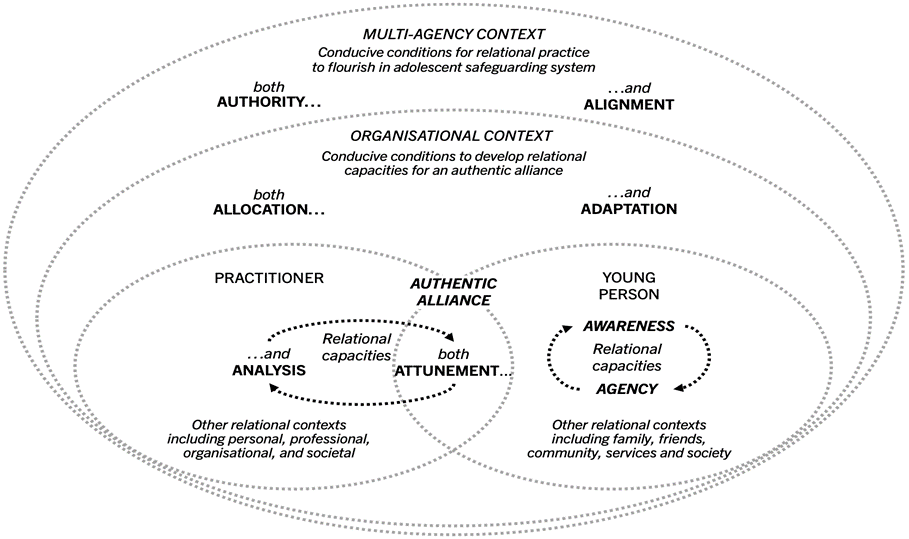24/07/2024
By Colin Michel and Luke Billingham
In this blog, Colin Michel and Luke Billingham introduce their article on relational practice in adolescent safeguarding systems. To read the full article, click here, or scroll to the bottom of this page.
Colin and Luke would like to express their gratitude to Dez Holmes, Jeanne King, Sunniva Minsaas, Ben Byrne, Betty Lynch and Alex Honnan-MacDonald, who thoughtfully reviewed an earlier version of this article, and provided helpful comments and encouragement.

There is widespread agreement among both researchers and practitioners that high quality relational practice with young people forms an essential foundation for effective adolescent safeguarding. But there is substantial professional uncertainty about what it means to ‘do’ relational practice well, and what it should involve.
The term ‘relational practice’ does not have an agreed definition (Lamph et al 2023). It is used to refer to several types of relationship: professional relationships in direct work with young people; young people’s relationships with people, places, and agencies; and the relations between professional roles, organisations, and sectors. Improvements in each and all of these relationships can result in substantial benefits for young people’s safety.
We suggest that the capacities for attunement and analysis are central to relational practice, and are thus vital for adolescent safeguarding, whether practised in social work, youth work, youth justice, community development, or other professions in direct work with young people. These capacities enable practitioners to both connect with and assess young people’s situations, as well as to support the development of young people’s wellbeing and agency.
There are several constraining forces which can prevent relational practice from flourishing in adolescent safeguarding systems. Relational practice is demanding on those working with young people facing complex risks and harms. Practitioners can be expected to nurture and sustain these relationships with minimal practical guidance, while working within inflexible, excessive and/or conflicting procedures, with large workloads, and under considerable pressure. Managers can find themselves expected to narrow practitioners’ attention to risk management in work with young people. This can operate at the expense of attentiveness to relationships, and limit potential to support positive change in young people’s lives. For strategic leaders collaborating in multi-agency systems, the aliveness of relational practice with young people can sometimes get lost from view.
Practitioner development of knowledge, skills and confidence through reflective supervision and systems leadership can support relational practice to flourish. We put forward a framework to show how conducive conditions for relational practice can be fostered. The framework aims to guide practitioners, managers and leaders, and to support exploration of constraints on and enablers for relational practice within local areas.
Our aim is to strengthen the case for strategic leaders to create conducive conditions for relational practice to flourish in adolescent safeguarding systems.

👉Download the 9xA conducive conditions framework here
Adolescent Safeguarding in London (ASIL) Handbook
- This is the first article in a series dedicated to the forthcoming second edition of the Adolescent Safeguarding in London (ASIL) handbook.
- ASIL is a practice handbook for everyone who works to build safety with young Londoners facing different types of harm in their lives.
- The first edition of the handbook was published in 2022. Currently, the central ASIL project team is developing a second edition which will be published in late 2024.
